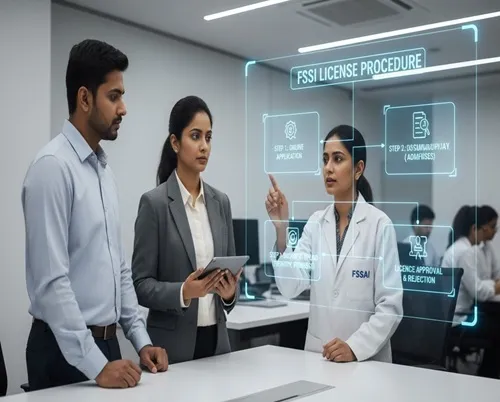
The Food Safety and Standards Act, 2006 (FSS Act) is India's main law for food safety and hygiene. It ensures that every food product—from street food to packaged snacks—is safe, clean, and properly labelled. The law created the Food Safety and Standards Authority of India (FSSAI) to regulate, inspect, and certify all food businesses.
Key Features
| Aspect | Details |
|---|---|
| Authority | Food Safety and Standards Authority of India (FSSAI) |
| Scope | Applies to everyone handling food — manufacturers, hotels, caterers, street vendors, and online sellers |
| Main Objective | To protect public health and ensure food safety |
| Mandatory License/Registration | Every food business must register or get an FSSAI licence |
| Labelling Rules | Products must mention expiry, ingredients, FSSAI number, and allergens |
| Testing & Inspections | Regular random inspections and food sampling by Food Safety Officers |
| Banned Acts | Sale of adulterated, misbranded, or expired food |
| Penalty | Up to ₹10 lakh fine or imprisonment depending on the offence |
How to Apply for an FSSAI Licence
| Step | Process |
|---|---|
| 1 | Visit https://foscos.fssai.gov.in |
| 2 | Select "Apply for New Registration/License" |
| 3 | Fill in details about your food business type, location, and turnover |
| 4 | Upload required documents |
| 5 | Pay the prescribed fee |
| 6 | Submit application and track status online |
| 7 | After inspection (if needed), licence is issued with a unique FSSAI number |
Documents Required
| For Registration (small vendors) | For State/National Licence (bigger units) |
|---|---|
| Passport-size photo | Passport-size photo |
| Aadhaar card / ID proof | Aadhaar card / ID proof |
| Proof of business address | Proof of business premises |
| Type of food handled | Layout plan of unit |
| Declaration form | List of directors/partners |
| — | NOC from municipality or local body |
| — | Water testing report (for water-based food units) |
| — | Equipment list (for manufacturers) |
Licence Type by Scale
| Category | Turnover Range | Licence Type | Issued By |
|---|---|---|---|
| Petty Food Business (small vendors, home kitchens, stalls) | Below ₹12 lakh | Registration Certificate | Local Food Officer |
| Medium Food Business (restaurants, small manufacturers) | ₹12 lakh – ₹20 crore | State Licence | State FSSAI Office |
| Large Businesses (big brands, exporters, importers) | Above ₹20 crore | Central Licence | FSSAI Central Office, Delhi |
Common Offences & Penalties
| Offence | Penalty |
|---|---|
| Sale of unsafe or adulterated food | ₹1 lakh – ₹10 lakh + jail up to 6 months |
| Misbranding or false labelling | Up to ₹3 lakh |
| Operating without FSSAI licence | ₹5 lakh + business closure |
| Sale of expired products | ₹5 lakh + product confiscation |
| Unhygienic premises or food handling | Up to ₹1 lakh |
| Obstructing Food Safety Officer | ₹2 lakh or imprisonment |
Food Safety and Standards Act, 2006 – FAQs
-
1. Who needs an FSSAI licence?
-
Every person involved in making, packaging, storing, selling, or distributing food.
-
2. Can street food vendors get an FSSAI licence?
-
Yes. They need to apply for basic registration.
-
3. What if a restaurant doesn't display the FSSAI number?
-
It's a violation—consumers can complain via the FSSAI portal or app.
-
4. How can consumers verify a food licence?
-
Visit https://foscos.fssai.gov.in and enter the licence number on the homepage.
-
5. What's the licence validity period?
-
1 to 5 years, renewable before expiry.
-
6. Can a home baker or tiffin service register?
-
Yes. They can apply for basic registration online.
-
7. What happens if expired food is sold?
-
The seller can be fined up to ₹5 lakh and face jail.
-
8. Is labelling mandatory for all products?
-
Yes. Every packet must mention ingredients, expiry, FSSAI number, and allergen info.
-
9. Can consumers get food tested?
-
Yes. Complaints can trigger lab testing by FSSAI officers.
-
10. Is an FSSAI licence needed for online food delivery platforms?
-
Yes. Both the platform (like Swiggy/Zomato) and listed restaurants must have valid licences.
(Food Safety and Standards Authority of India) to set food standards and check if companies follow them.
Add new comment